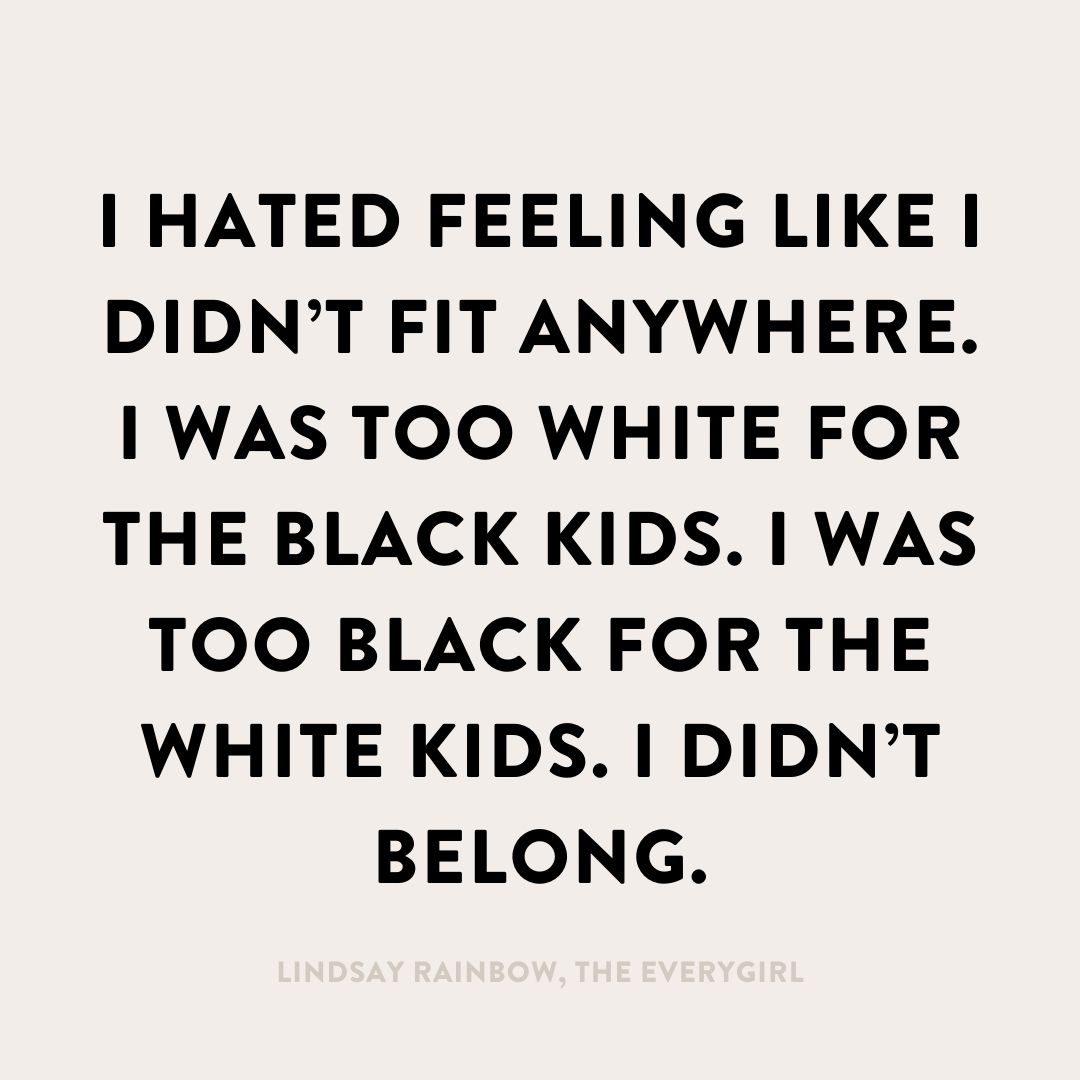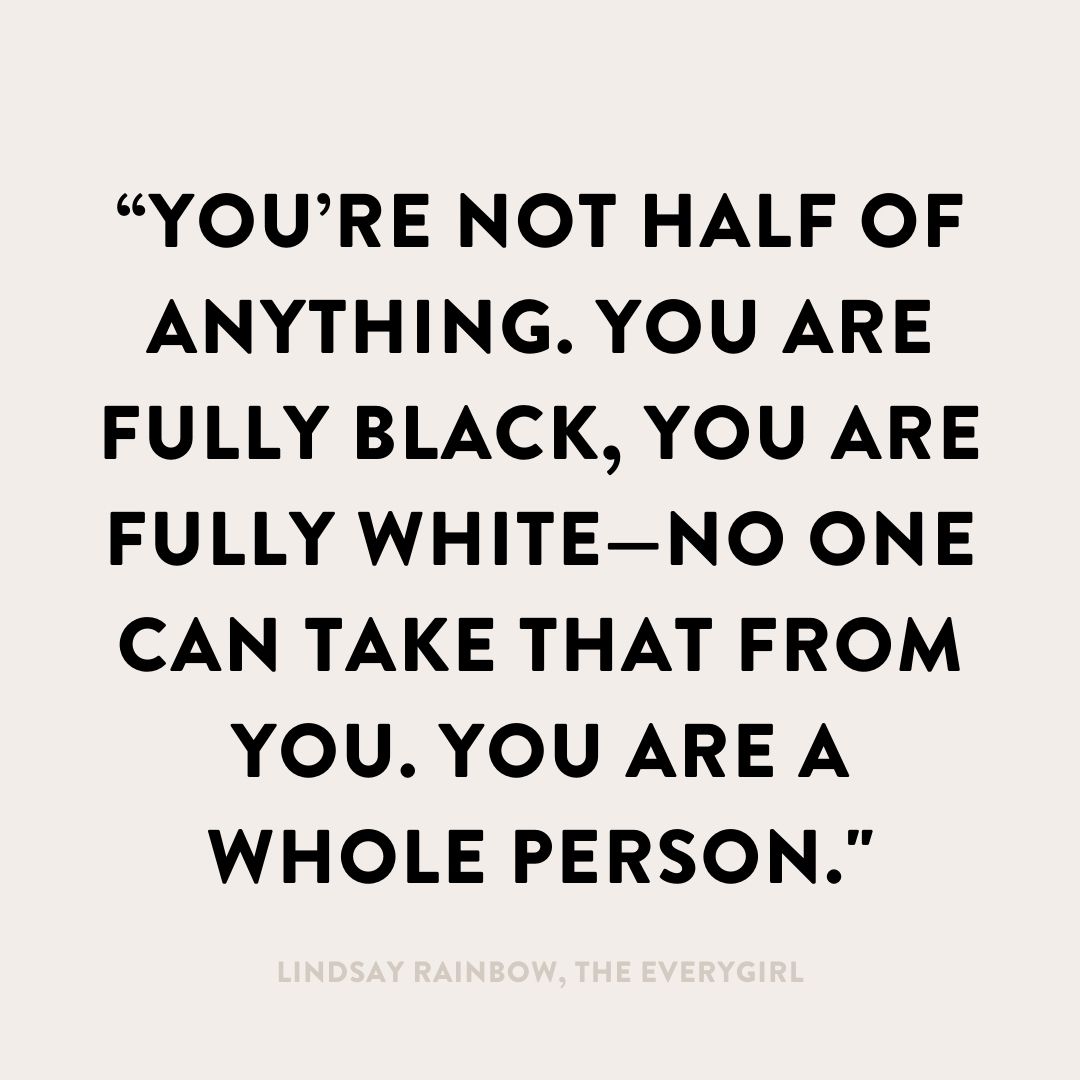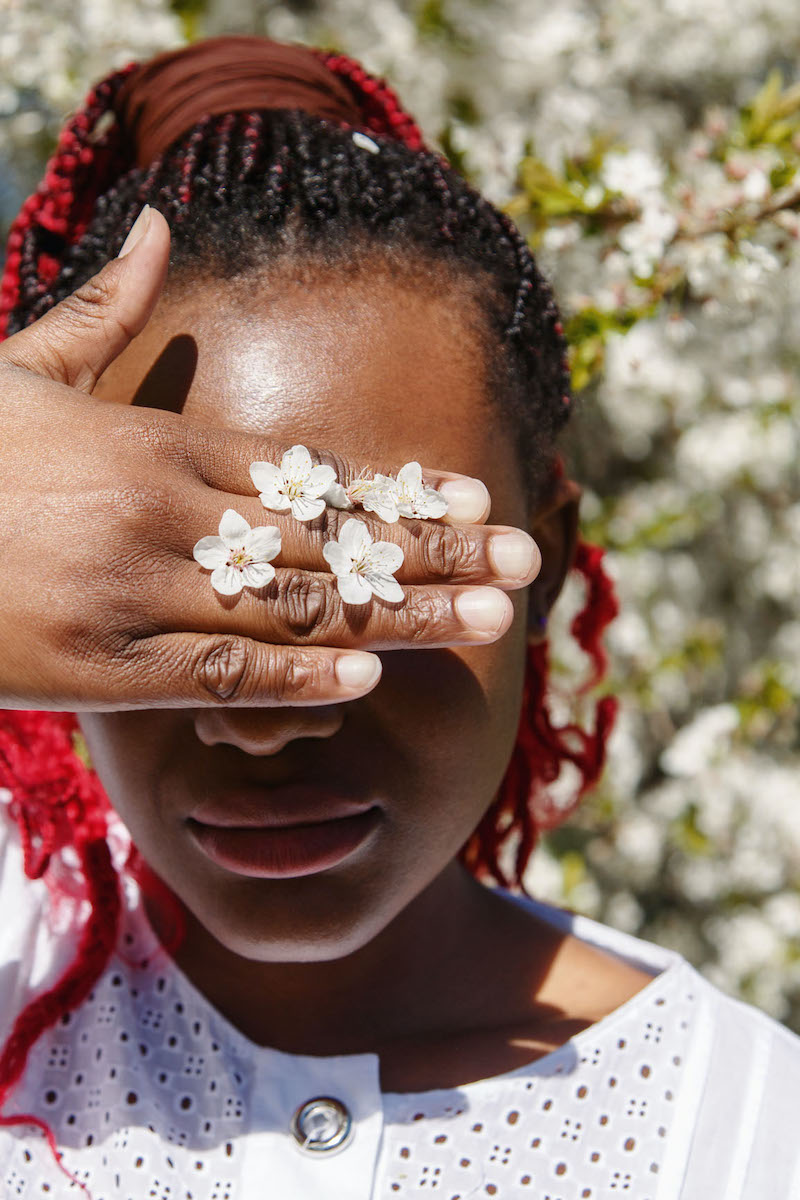As a biracial Black girl with one white dad or mum and one Black dad or mum, who would additionally sometimes be known as “mild pores and skin,” my earliest experiences with my racial id had been complicated, to say the least. I grew up solely figuring out my white prolonged household and residing in a largely white neighborhood. For so long as I may keep in mind, members of the family, pals, and even strangers would make feedback like, “oh, you’re a lot lighter than your brother” or in the summertime, “wow, you’re so darkish.” These feedback in all probability appeared innocent and insignificant to those people. However for me, these delicate slights, referred to as microaggressions, made me really feel like an “different,” and I internalized these messages, repeating them time and again. I felt continually picked aside for my Blackness, if not for my complexion then due to my huge African nostril that I received from my dad or my “loopy,” “frizzy” curls. I understood early on that on the earth, lighter pores and skin, straighter hair, and Eurocentric options had been higher and good. That was the default that folks favored and accepted. However as a younger mixed-race child, what was arduous to reconcile was that with others, particularly those that seemed extra like me, maybe it was extra acceptable to have darker pores and skin and curly hair as a substitute. How was I presupposed to navigate each of those worlds? I felt pressured to decide on.
We’ll circle again to my id disaster, however I wish to first acknowledge that mild pores and skin privilege is an actual factor, and I’ve it. As a lighter skinned Black particular person, I’m much less more likely to face discrimination in my on a regular basis life than darker skinned Black people. I’m much less more likely to be incarcerated, extra more likely to expertise larger ranges of instructional attainment, extra more likely to be perceived as clever in a job interview, extra more likely to have a better lifetime incomes potential, extra more likely to obtain entry to high quality medical care—the listing goes on. Colorism (a type of discrimination primarily based on desire towards and privilege for BIPOC folks with lighter pores and skin) is extraordinarily damaging to darker skinned folks. It’s additionally uniquely insidious due to the rifts and division it could actually create inside households and communities. One among my favourite exhibits, Black-ish, devoted an episode to this very subject, titled “Black Like Us,” the place they explored the way in which darker skinned members of the identical household skilled the world compared to their lighter skinned members of the family. It’s an unimaginable episode, tackling a fancy subject in a method I’d by no means seen earlier than on TV.
Whereas acknowledging the quite a few methods by which I’ve benefitted from my mild pores and skin privilege, there’s a duality that exists for me within the unseen (and barely understood) id disaster that I alluded to beforehand. Emotions of illegitimacy, like I’m a fraud or an imposter, as a result of I’m a couple of shades lighter than my brother and plenty of shades lighter than my dad; as a result of I didn’t develop up surrounded by my Black members of the family, Black influences, or in a Black neighborhood; as a result of there was no person to show me to like my curly hair as a substitute of combating towards it with warmth and chemical substances; as a result of no person talked to me about race once I was youthful, and once I heard it mentioned, it was not in a method that gave me an understanding of who I used to be; as a result of I solely ever heard Blackness mentioned within the context of racism, and that made me really feel afraid and ashamed to embrace an enormous a part of my id for a really very long time (good day, internalized racism).
One of the vital widespread questions folks of multiracial backgrounds are requested upon assembly somebody new is, “What are you?” When folks requested me “what I used to be” (on an apart, please don’t ever ask folks “what” they’re), I all the time mentioned I used to be half Black and half white—I’m Zimbabwean, German, and Norwegian. I didn’t know precisely “what” I used to be past that, however I knew what I wasn’t. I knew I wasn’t white within the “proper” method as a result of even once I referred to myself as half white or talked about my European ethnicity, folks would have a look at me humorous. However I by no means felt totally Black both. I didn’t know what that meant in my thoughts, to be “totally Black,” apart from, possibly, having two Black dad and mom.

I’ve a definite childhood reminiscence from round age 8 or 9. It was summer season, and I used to be sitting with my brother and our two household pals, whose dad and mom had been additionally interracial like ours. We had been all even toastier shades of brown than ordinary, in the way in which that occurs to melanated people after a summer season outside. I used to be the lightest of the 4 of us, which I’d all the time been, however on this specific day, that was unhealthy. All of them sat on one facet of my childhood bed room and I sat on the opposite facet. I wasn’t allowed to affix them on their facet. They taunted me as a result of I wasn’t Black like them. I attempted to behave prefer it didn’t hassle me, however I couldn’t maintain again my tears. There have been a whole lot of issues I didn’t perceive again then, together with a lacking group and sense of belonging I didn’t know I used to be in search of. What I did know is that I hated the sensation of all the time being questioned and having to show or defend my id. I hated feeling like I didn’t match anyplace. I used to be too white for the Black children. I used to be too Black for the white children. I didn’t belong.
A few years and plenty of conditions after that incident, I used to be beginning my profession, and the corporate I labored for had an Worker Useful resource Group for its Black staff and allies. I observed they had been recruiting members for a reverse mentorship program, the place staff can be matched with senior executives and act as their mentors. It gave the impression of a cool program and idea, however I used to be hesitant to use. Trying on the promotional supplies and the pictures of Black faces, in all completely different shades, the resounding thought in my thoughts was, “I’m not Black sufficient for this.” I didn’t apply. Months later, I ended up engaged on a undertaking with one of many executives who led the mentorship program. He was additionally biracial like me. We had been driving in a cab to the airport, having a dialog about race and biracial id, and I informed him how I hadn’t utilized to the mentorship program as a result of I used to be “solely” half Black. He stopped me instantly and mentioned one thing that hasn’t left me since: “You’re not half of something. You’re totally Black, you might be totally white—nobody can take that from you. You’re a complete particular person.”

That dialog sparked the onset of a brand new mindset for me round race and my id. It modified the way in which I thought of myself, led me down an extended path of analysis and soul looking, and was the start of the top of the id disaster that had plagued me for years. One thing I perceive now—that I didn’t totally perceive or settle for once I was rising up—was that as a Black particular person, folks will all the time see me first for my race. After I stroll down the road, they’ll see me with out figuring out something about me, and whether or not consciously or unconsciously, of their thoughts, they’ll categorize me: “Black.” Whereas I refuse to be half of something, I do know that I don’t expertise the world the way in which white girls do, and that may be a truth. I’m Black, and Black identities can by no means be totally separated from the constructs of race that we’re considered via, no matter how we view ourselves. However whereas it might not all the time be seen, my life, experiences, and worldview have been formed by a mixing of cultures and identities, and that mixing is what’s made me who I’m. I’m a biracial Black girl, and I like being Black. Although generally I nonetheless really feel that I don’t “match” anyplace, it doesn’t hassle me prefer it did once I was a child. I don’t have something to show.

Supply: The Every Girl
